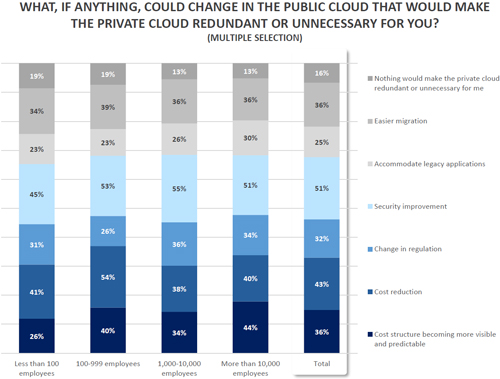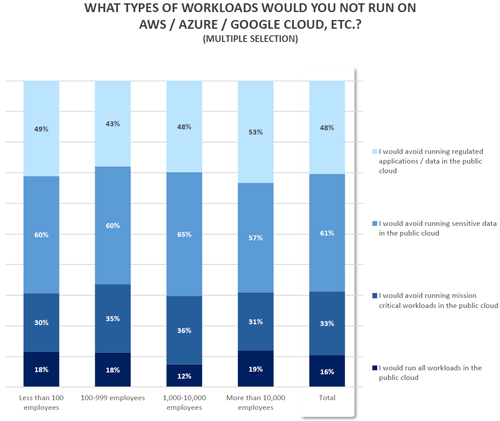News
Security, Vendor Lock-In Top Public Cloud Concerns
A recent study by Stratoscale identifies the biggest deterrents to public cloud adoption among enterprises.
Stratoscale polled over 650 IT professionals representing a wide variety of enterprise sizes and industries for its Hybrid Cloud Survey (available here with registration), and found that despite the increasing ubiquity of cloud technologies, a surprisingly low number of enterprises have moved a significant portion of their workloads to the public cloud.
Specifically, 14 percent of participants have not begun migrating to the public cloud at all, while nearly two-thirds (65 percent) have migrated just 20 percent or less of their workloads. There's some disparity between small businesses (those with fewer than 100 employees) and large enterprises (over 10,000 employees), with smaller companies tending to be more advanced in their migrations than their larger counterparts.
For both types of organizations, however, there seemed to be a consensus about the ways in which the public cloud falls short of private and on-premises environments. When asked what factors would be most likely to persuade them to move their workloads to the public cloud, just over half (51 percent) of all respondents cited "security improvement," followed by 43 percent who cited "cost reduction."
 [Click on image for larger view.] Source: Stratoscale
[Click on image for larger view.] Source: Stratoscale
The majority of respondents (61 percent) also said they were more likely to keep sensitive and regulated data on-premises than on the public cloud -- not surprising, given the widespread concern over security.
 [Click on image for larger view.] Source: Stratoscale
[Click on image for larger view.] Source: Stratoscale
Those security fears are not unfounded, especially given the recent spate of data leaks and security vulnerabilities that have been linked to public cloud leader Amazon Web Services (AWS). In the past two months, misconfigured Amazon S3 buckets have led to sensitive data from the Republican National Committee, Verizon and Dow Jones & Company being compromised.
Another factor that was cited as a major deterrent by over 80 percent of respondents was public cloud vendor lock-in, especially among organizations with fewer than 100 employees. That's in keeping with other recent surveys that have found that businesses are growing wary of the perceived lack of flexibility in the public cloud market, which is mostly a duopoly consisting of AWS and Microsoft Azure.
"The findings from our survey confirm what we're hearing from our customers -- although many have started their journey to the public cloud, the vast majority of companies are still running mission critical workloads and sensitive data in private solutions, primarily for security reasons," said Stratoscale CEO Ariel Maislos in a prepared statement. "It's clear the hybrid cloud model represents the near and long-term future for most enterprises, regardless of size."